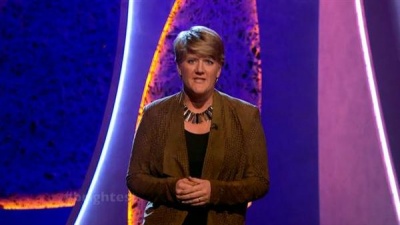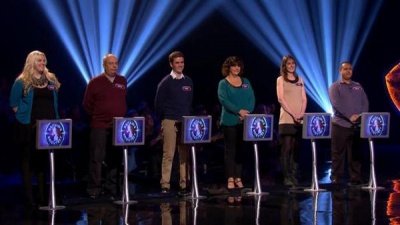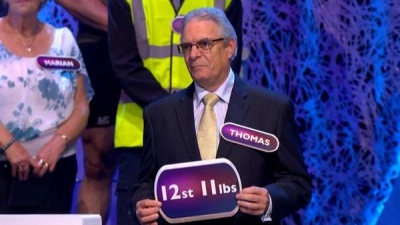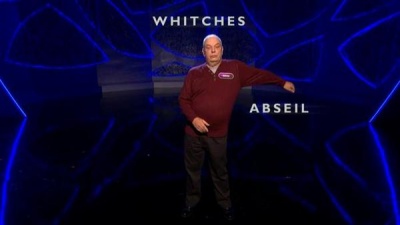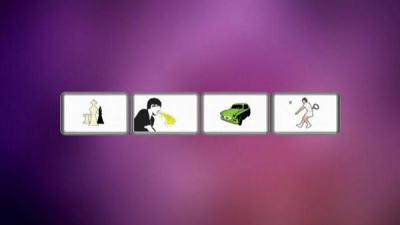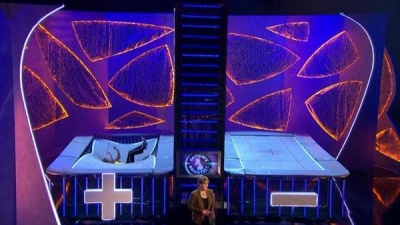Weaver's Week 2013-02-03
Last week | Weaver's Week Index | Next week
This week, we shine bright. Like a diamond.
Contents |
Britain's Brightest
RDF Television for BBC1, from 5 January
Last week, we watched ITV's big Saturday night programme, and almost fell asleep. This week, we're watching the other side, and while the details of Britain's Brightest are annoying us, we're loving the concept.
The differences between Britain's Brightest and Splash! are obvious from the beginning. ITV's show is live from a swimming pool, it's echoey and a bit ragged. Stuffed full with minor celebrities, the show is hosted by two of ITV's established faces trying to get excited about a large tank of water. The BBC programme is pre-recorded and edited down so that all the chaos is taken out and it looks and feels polished. The contestants are ordinary people, and it's hosted by Clare Balding. If she'd wanted it, Clare could already be one of the BBC's most established and respected presenters, but she's chosen to concentrate on her passion of horse racing, only recently branching out into radio documentaries – we heartily recommend the "Sport and the British" series Clare made last year.
The basic conceit of Britain's Brightest is to find the nation's best brain. Rounds will test all sorts of intelligence – estimation, observation, emotional intelligence, learning, time perception, and more. Comparisons to The Krypton Factor aren't entirely unreasonable, though there's no physical test, and most contestants don't do anything that has the fitting shapes together ethos of the Intelligence round.
Each of the heats features six contenders. They're introduced in pairs, and each has made a short film in their daily life. It helps to explain what they do, where they see their strengths, perhaps where they might be a bit weak. It also helps to fill the time – it's almost ten minutes before the first challenge proper begins, and nearly half-an-hour before we've met all six players.
After seeing the little films, each pair takes part in one of a small number of challenges. There's a "picking people out of a small crowd" puzzle, where the skill is correctly estimating the age (or weight) of people who the players have never met. There's a "which of these words is incorrectly spelled" challenge, and a "complete the sequences" battle. All of these challenges are subdivided into three smaller rounds – the first age puzzle might be to find one of three people who have 27 years; later rounds might look for two people with 75 and 110 years between them. Two points for winning each round.
At this point, we start to pick holes in the format. Two points for winning each round, yes, but the programme doesn't allow a draw here. When both players find one of the people aged 27 years, the natural thing to do would be to say that they're both as good as each other, and award a point each. Not on Britain's Brightest; here, a draw is no result, and the points are carried forward to the next mini-round. We can see what they're doing, but we don't see why there's a problem with having a draw.
And then we start to pick holes in the rounds. Estimating people's ages is one thing, the year is the natural unit. (Except for people who count the days to work out when it's no longer creepy to date someone half your age plus seven years, but we are better than Billy Corgan.) Estimating people's weights uses a strange measurement, the "stone", divided up into "pounds". This column doesn't naturally think in these arcane units, and really has to work it out: one "stone" is fourteen "pounds", and one "pound" is four-ninths of a kilo, so three "stones" will be about 19kg, so twelve "stones" is ... oh, who cares, our head hurts.
Rather than calling out the wrong word, or pressing buttons, the Self-Reproducing Konnect Spelling round (as one commentator almost put it) uses arm gestures and motion-capture technology to determine which words the contestant thinks are wrong. It looks flashy on the screen, but it means that the round can be – and has been – decided on the basis of how well someone can point their arm. Again, we can see that this is a valid thing to be testing, but not that it's right to be testing it in this round.
The show has also featured a sequences puzzle, borrowing the basic idea from the Sequences round of Only Connect: given the first three terms of a sequence, what comes fourth? It's a best-of-seven round, though this is disguised with the conceit of filling a volcano. "White, Black, Blue" – as in the colours of an archery target – was one of the questions from the OC back in 2008. And some of the questions would be chewed up and removed when Victoria Coren flosses her teeth: "M is to 3 as H is to what?" We reckon it's two, being the number of points that aren't straight lines. They reckon it's four, being their values in Scrabble. Not just "complete the sequence", but "complete the sequence we're thinking of".
Around this point, there's a short film in which street scientist Steve Mould explains a piece of psychology about how the brain works. Science on a Saturday night? Wouldn't get this from ITV.
Next up is a group challenge for all six players. This could be an observation test, trying to concentrate on two or three performances at once and answer questions on it later. This is an excuse to bring in some performing animals, or book dance act Diversity. Regrettably often, there's a selection of pictures which (we're assured) can be said together to form a famous person or phrase. Consonants are dropped, vowels missed, and we suspect that the round only works correctly if spoken in Estuary English. Pseudo Names it is not.
Rather than award points directly to the leader board for correct answers, there's a convoluted scoring system. This really isn't good enough – with two rounds of rebuses, it's perfectly possible to award 6-4-3-2-1 points. And after all this picture puzzlery, the lowest scorer leaves. Again, there's absolutely no reason to have an elimination here, it's just something they've chosen to do.
With four players left, the show moves on to a "multi-tasking" round. Here, the idea is to time a short period of time – twenty-something seconds – while making four-letter words on a touchscreen. Points for making the words, points deducted for going over time, and bonus points for hitting the time precisely. Again, the scoring is a mess – some contenders have completely forgotten to stop the clock and finished with minus 40 points, and any player who doesn't go over time is going to do very well indeed. And at no point has it been said that the words need to be English words, still less common English words.
Yes, we're being picky. Yes, we're being sticklers for precision. No, we're not sorry. This is a serious competition, it's being played for a quality prize, and we do get the feeling that too many corners are being cut, that the show has been a little bit thrown together. This isn't evident in the studio design, or the show's music – often rousing, occasionally quiet, always setting to mood well.
The greatest evidence for this slackness is in the very last round. While the show winner has qualified for the final, and the last-placed person has been eliminated, the middle two players take part in a Grand Slam-style playoff. Each has 90 seconds on their clocks, and they're given a board of 30 squares, behind each of which is a simple puzzle, the likes of which we'd expect to see in a Test Your Own IQ book. They can pass on a question, leaving it available for the other contestant, which is reasonable tactics. Play transfers on a correct answer, but the player has to push a button to stop their own clock and start the opponent's; this is a bizarre decision.
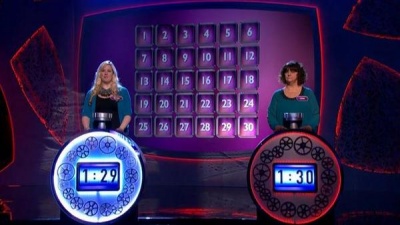 The two players compete in a round pilfered from Face the Clock.
The two players compete in a round pilfered from Face the Clock.
And so it goes. Britain's Brightest is respectful of its contestants, celebrating their brilliance without sneering at them as lesser shows have done. (The National Lottery The People's Quiz, we're thinking of you.) There's something entertaining for the casual viewer in each episode, there's something of interest to the hardcore geek like this column. We're frustrated by some of the editorial decisions, but really hope that there's a Britain's Best Brain 2014 to set some of them right.
Countdown Update
It's the second week entirely spent in the Round of 32; winners will return in the third week of February, towards the end of the Round of 16.
Match 16 was contested by Christine Hunt (finalist, 1984) and Sandie Simonis (contender in 1986). It's a game with a large number of errors – both players had "rematched" disallowed in the opening round, "asorbing" and "unheals" were also declined, and though Christine had the winning word "Lettuce", she also missed a fairly easy numbers game. Sandie got her winning word "Bringer", and parity in the remaining rounds meant Christine needed the conundrum to force a tie. She got "unsugared" in about 20 seconds, so the match was a 78-78 draw. Christine solved the tie-break conundrum – again after 20-odd seconds – and will return next month, to meet the winner of match 19.
Match 17 was half way through the First Round Proper, and pitted Paul Keane against Neil Zussman (semi-finalists in 2011 and 2009). Can one have "potaged", mused Neil; no, one can't have had soup, and that missed risk allowed Paul a six-point lead. Paul "Doubled" his lead early in the second stanza, but this game had ebb and flow – Neil came back with "Underact", and Paul double-counted a letter to gift his opponent a one-point lead, enhanced by "Astroid". Neil had draw rights in the conundrum, but solved it in a second to win by 99-81.
Neil will play the winner of match 18, between Dave Hoskisson and Mike Whiteoak (semi-finalists, 2001 and 1987). Dave had a very risky eight in an early round, and "loafiest" was never in, but the gap came down to a single point when Mike used the "A" twice. "Haulers" was a positive winner for Dave, and after a few equal rounds, Mike brought out "Asteroid". But then Dave was "Vetoing" the idea of losing, and then organised a "Pyramid" scheme to move twelve ahead with four to play. Mike pulled "Lactones" out of the bag in the last letters, and the conundrum was missed. Dave won by 85-81.
Hard hats were required for match 19, between Graeme Cole and Jack Worsley, champions from recent series. Graeme played a good game. Graeme played a very good game. After 13 rounds, he was still on for a perfect game; nothing in the dictionary was longer than any of his words, and he'd solved both numbers challenges. Jack was just two letters off perfection, but that translated to a 14-point gap – "Unclean" and "Pukiest" were the difference. And then it all changed in the final numbers round: four large, a 1 and a 1, and Jack gets it spot on! To the crucial conundrum, Jack shouted "Guidepost" on one seccond, and from nowhere he came out the winner, 104-98. Hats off to the both of them!
Match 20 was between John Ashmore and Kirk Bevins (champions, 1998 and 2009). Innis Carson lies in wait. The scores reach Deuce by the anecdote, then Kirk had winners by the "Busload", then "Cultigen" – a plant species that only exists in cultivation. We all knew that. Fifteen behind, John had to gamble , lost the gamble, and that was that. Scoring in each round, and boosted by a nine-letter word, Kirk's winning score was 130-92. One Hundred and Thirty!
This Week And Next
In University Challenge, Bangor took on Durham. In the first round, Bangor had a low-scoring win over St Andrews, Durham an easy win over Strathclyde. In almost no time, Bangor took a 70-point lead, then Durham pulled back a good way. Bangor moved ahead, Durham reeled them back a little. The game was high-scoring – not until the eighth set of bonuses were more wrong than right, a standard that couldn't quite be maintained.
Bangor's lead held through to the second picture round, gently trimmed down to just 25 points, and then to ten. Bangor got a starter to restore a good advantage, but two starters for Durham meant they had their first lead of the night. Bangor had the next starter to draw level, and took the next one to have the lead back. There's only time for the one bonus question, which means that Bangor has taken the win, by 175-165.
All of which means that Bangor joins Pembroke and King's of Cambridge, New of Oxford, St George's and University College of London, Manchester, and Imperial College in the last eight. The group phase – and our longer reviews – begin next week.
Winning Mastermind is "the greatest honour the quiz world has to offer" according to the host. Humpo, don't go there.
- Michael Webb (Field Marshall Haig) gets some detailed questions about his life and (mostly) military career, concluding on 8 (1). He's straight back into the chair – we're playing in exact reverse order tonight – and sails through his round with very little resistance, finishing on 23 (5). Probably not a winning score, certainly a very creditable performance.
- Tim Jarvis (Novels of Jasper Fforde) gets a round primarly on the Thursday Next books, omitting much reference to the Nursery Crime series. In the context of Fforde's canon, it's like someone taking Countdown as their subject and only being asked about the Richard Whiteley era. 10 (0) isn't enhanced when the contender confuses 3-2-1 with Blockbusters, but he clearly has a good general knowledge and closes on 22 (3).
- Didier Bruyere (Marie Curie) recalls "The Floating University", which we thought was just a sketch from some comedy genius like Rod Hull. 11 (1) is a jolly good score in any language, and we think Didier's first tongue is French. His first general knowledge answer is "Karl Marx", and he perhaps won't get the reference to David Aaronovitch. It's about the only thing he won't get, and 27 (1) puts him firmly in contention for the next round.
- Katy Bateman (Red Dwarf) has the greatest opening two minutes this show has to offer, a Perfect Round of 14 (0). She'll need to double the score to win, and it soon becomes clear that she'll answer what she knows, and pass what she doesn't. There's perhaps one or two more gaps than are needed to win, with a final score of 24 (5).
So Didier Bruyere will be appearing in Mastermind's Top Thirty, which begins in just three weeks.
Some interesting new orders. Well done to The Chase, which has been bought for 324 more editions – 300 for the daytime, 24 editions involving ITV celebrities. Also renewed is Girlfri3nds, an ITV2 dating programme that is a game show if you squint at it in the right way. Tipping Point is coming back for a new series, there are contestant calls for ITV juggernauts The Cube and Who Wants to be a Millionaire, and BBC The Voice UK (as the press office calls it) will air its live shows in June. Surprising news for Who Dares Sings! – over five years after its brief run on Saturday nights here, the show will be remade for audiences in Columbia and the United States. Folks, you don't know what's about to hit you.
BARB ratings for the week to 20 January show Dancing on Ice remains number one, with 6.9m seeing the dances. In It to Win It took 5.5m, and the country was knocked comatose by Splash!, 5m there. 4.9m for Family Fortunes, 4.5m for Take Me Out, and The Chase took advantage of widespread snow to record 3.75m on Friday. University Challenge had 3.45m, Celeb Big Brother 2.8m, 8 Out of 10 Cats returned to 2.4m, a fully-networked Mastermind had 2.15m, and Eggheads peaked at 1.65m. That compares with 1.17m who saw some of the team soundly beaten on Only Connect. Got to Dance 4 impressed 715,000 on The Satellite Channel, and More4 had 530,000 seeing Come Dine with Me.
Some notable shows are missing from the published lists. Britain's Brightest failed to trouble the BBC1 top 30, demonstrating that it had fewer than 4.5m viewers. Deal or No Deal is out of Channel 4's top 30 shows, clearly Tipping Point has pushed it beneath 1.4m faithful. And 5* is turning into the rest home for past-it programmes – joining Big Brother on the listing is Pop Idle Us, but fewer than 220,000 people tuned in for the auditions. Last year, something like 750,000 saw the parade of rubbish singers on ITV2.
Another quiet week for new programmes: Masterchef Australia on DTTV (Really, 7pm from Sunday), and the final of Britain's Brightest (BBC1, 7.20 Saturday). Carry on at this rate and we'll have to riff off one of the Dancing on Ice competitors. Now, where did we leave those eighties videos..?
To have Weaver's Week emailed to you on publication day, receive our exclusive TV roundup of the game shows in the week ahead, and chat to other ukgameshows.com readers, sign up to our Yahoo! Group.

